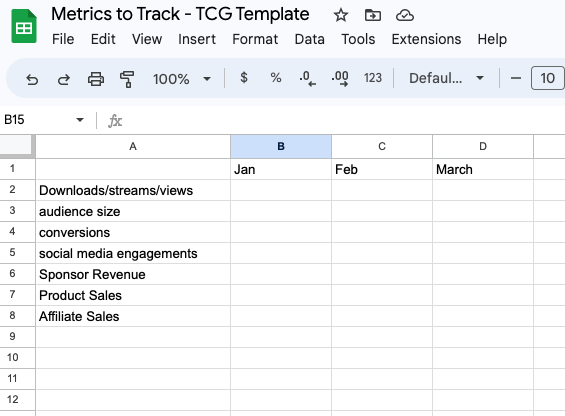Metrics that Matter: Growth + Engagement for Podcasters, Speakers, and Coaches
Whether you're a podcaster, speaker, or coach, tracking your marketing metrics is important for understanding how your audience engages with your content and ensuring a positive return on investment. Keep reaching for the top marketing metrics to track to maximize your content.
Why tracking marketing metrics is important for podcasters, speakers, and coaches.
Tracking marketing metrics is important because it provides insights into the effectiveness of your content and marketing efforts. Without tracking, you won't know what's working and what's not, making it difficult to make informed decisions about how to improve. Tracking metrics can also help you understand your audience better, allowing you to create more targeted and engaging content.
Top Marketing Metrics to Track
Audience Engagement Metrics to Track
Number of Downloads/Streams: Tracking the number of downloads or streams can help you understand how many people are tuning in to your content and how often. It can also help you track trends over time to see how your content resonates with your audience and the popularity and reach of your podcast or content.
Your Audience Size: This includes your followers across all of the social media platforms you are active on—the number of people subscribed to your newsletter. You could also include the number of page views or sessions on your website monthly.
Conversion Rates: How many people are taking action? This includes the number of link clicks from social media to your website, the number of opt-ins, opens, and clicks from your newsletter.
Social Media Engagement: This is people interacting with you on social media. This could be anything from a like, comment, share, save, or story reply. There are varying definitions of social media engagement on the internets but this is the one we use here at TCG.
Revenue Metrics to Track
Sponsorship and Advertising Revenue: If you're monetizing through sponsorships or advertising, tracking your revenue from these sources is important. This metric can help you understand how much income you're generating from these sources and how effective your marketing efforts are in attracting sponsors or advertisers.
Product Sales: Digital products, merch, physical products, memberships, etc. Any one-time purchase that sells your property be it intellectual or physical. Tracking this number can help you see how mentioning these things in different areas can promote sales.
Affiliate Sales: Are there apps you love? Services you could scream about from the rooftops? Courses that blew your mind? ASK FOR AN AFFILIATE link and share it with your audience. It’s a win all around.
How to Implement Marketing Metrics Tracking
To track these metrics effectively, you’ll likely need to use a combination of tools and platforms like:
Google Analytics
Podcast hosting platform
Social media scheduler
E-commerce platforms
Affiliate tracking
Email marketing platform
My suggestion would be to start a Google Sheet or Notion Page that includes the following on the first tab:
Collecting all the info you need to track your metrics in ONE PLACE will allow you to set up a SYSTEM for tracking your numbers. This is important because, as the owner of your business, you cannot do it all, so having a system in place to track your metrics will allow you to pass off this task to a team member so you can just review the data rather than actually having to collect it yourself.
Now that you have the info you (or your team member) need all situated, we need to set up our datasheet. I will use the metrics I discussed earlier to keep things streamlined here. However, if you track more things, ADD THEM! Your metrics are deeply personal to your business, and you should be looking to track the things that move the needle.
Regularly review and analyze these metrics to identify trends, measure your progress, and make data-driven decisions to optimize your content strategy, marketing efforts, and revenue generation.
If you want to improve your content, you need to track marketing metrics.
You can gather valuable insights about your audience's behavior and optimize your strategies to yield the best results. You can better understand your audience by tracking your marketing metrics. Unless you track your audience, you'll never know what resonates with them and what doesn't. Making informed decisions, refining your approach, and supercharging your content are possible with the right metrics.
This is why we lean so much into content repurposing here at TCG. If we repurpose content our audience has already seen, we have data and can now refine and improve. And here I go again: you should ALMOST NEVER create content from scratch for content marketing purposes. You should be looking at data to make informed content decisions. Because without data, you might as well be posting dog videos or your latest sunset pic because you are not being strategic.
Want to get more strategic with your content?
Meet the Content Power-Up...
Picture this: 30+ graphics that scream your brand's awesomeness, complete with ready-to-go captions. And the best part? You'll have them in your hands in less than 30 days after our kick-off call. This is so much more than strategizing; we're playing the long game with evergreen content that keeps giving.
TCG is not a content creator; we don't just fill your calendar with random stuff and call it a day. Not here! We dive deep into the inner workings of your brand, crafting content that aligns with your promo plans and big-picture goals. We'll seamlessly integrate your brand's core messaging into your content feeds, making sure your most epic evergreen pieces get the spotlight they deserve.
Ready to get started? Click here >



